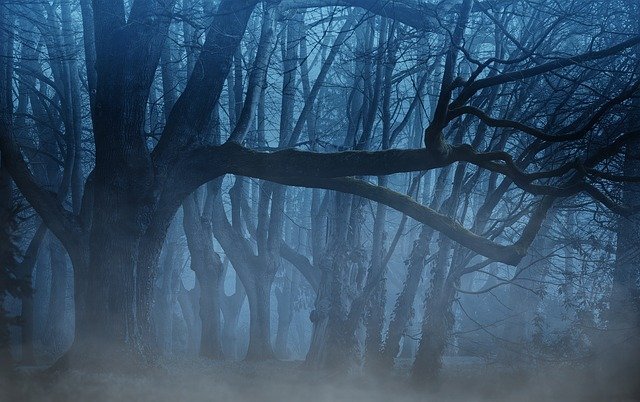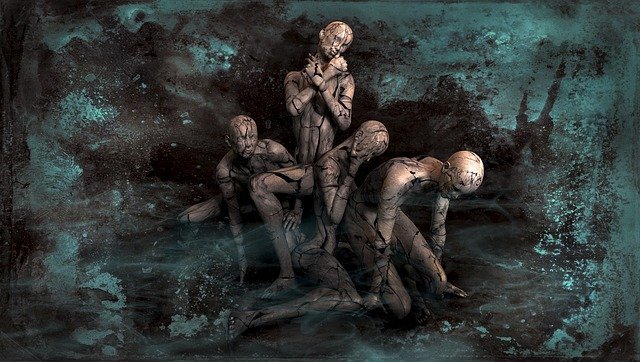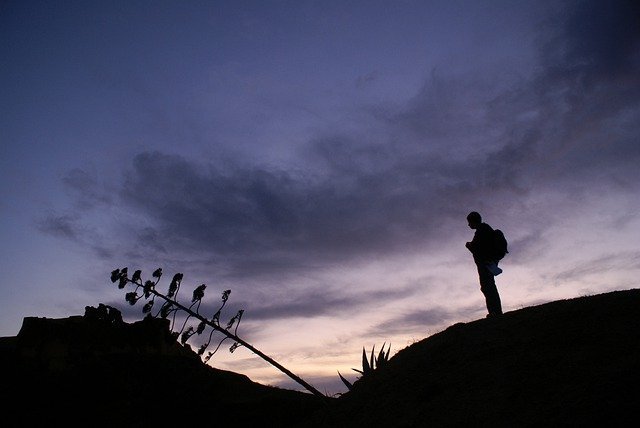[Eng-Esp] Evil, an eternal problem || El mal, problema eterno

Source
A few weeks ago one of the members of our community raised a problem that in one way or another has always been present and will always be present in the history of mankind, it is the eternal problem of the existence of evil, specifically the reason for its existence.
This is a problem that can be approached from various perspectives. From a philosophical-theological point of view, it is manifested in all its crudeness, since if God exists and allows evil, He is an evil god, which is incompatible with the quality of goodness that should prevail in Him, and if God exists but cannot prevent it, then He is not Almighty, another quality that should not be absent in Him.
In the first place, let us pose the problem from a philosophical point of view and let us say that in itself everything that exists has goodness, which can be corrupted in time. In the case of the human being, this is evident, since the structure of his being enables him to choose and carry out the good, however, he can also choose evil, and it is here where he is corrupted, it is something similar to what Rousseau said that man is good by nature, unlike him we complete the sentence saying not that society corrupts him but that this goodness of his being is corrupted by the bad decisions that each one takes.
Let us give a crude but quite graphic example of what we want to express: for a serial killer his first victims may be difficult for him, however, as he increases his number of acts he does everything even "for pleasure", and the inner goodness of his being has been corrupted.
The problem of evil is closely linked to the problem of human freedom, each one is the master of his life, of his being, and chooses how he wants to fulfill his existence. The particularity of this is that by doing evil we can believe that we are doing good (even if it is merely selfish), that is why we said that evil is "the corruption of good".
Hace unas semanas atrás una de las miembro de nuestra comunidad planteó un problema que de una u otra manera siempre ha estado presente y siempre estará en la historia de la humanidad, es el problema eterno de la existencia del mal, específicamente del por qué de su existencia.
Éste es un problema que se puede abordar desde diversas perspectivas. Desde un punto de vista filosófico-teologico se nos manifiesta en toda su crudeza, ya que si Dios existe y permite el mal, es un Dios malo, lo cual es incompatible con la cualidad de bondad que en El debería imperar, y si Dios existe pero no lo puede impedir entonces no es Todopoderoso, otra cualidad que en Él no debería estar ausente.
En primer lugar, planteemos la problemática desde un punto de vista filosófico y digamos que en sí todo lo que existe tiene una bondad, la cual se puede corromper en el tiempo. En el caso del ser humano esto es evidente, ya que la estructura de su ser le capacita para elegir y realizar el bien, no obstante también puede elegir el mal, y es aquí donde se corrompe, es algo parecido a lo que decía Rousseau de que el hombre es bueno por naturaleza, a diferencia de él nosotros completamos la frase diciendo no que la sociedad le corrompe sino que esta bondad de su ser se corrompe por las malas decisiones que cada uno toma.
Pongamos un ejemplo crudo pero bastante gráfico de lo que queremos expresar: para un asesino en serie sus primeras victimas le pueden resultar difíciles, no obstante, a medida que va aumentando su número de actos ya lo hace todo hasta "por placer", ya su bondad interna, de su ser se ha corrompido.
El problema del mal está muy unido con el de la libertad humana, cada uno es dueño de su vida, de su ser, y opta cómo se quiere realizar en su existencia. Lo particular de esto es que haciendo el mal se puede creer estar haciendo un bien (aunque sea uno meramente egoísta), por eso, decíamos que el mal es "la corrupción del bien".

Source

Now let us move on to consider the problem from a theological point of view, and we will discover that if we profess that God created the world and the human being within it, or as Christianity says, created us in His "image and likeness" this implies that he made us with the capacity to think and choose.
The way in which each one of us exercises these capacities is the reason for the existence of evil because sometimes we do not consider the things we do and we can cause evil by ignorance (when, for example, we take attitudes that others consider offensive and we do not), recklessness (how many accidents we have had in the past), recklessness (how many accidents we have had in the past, how many accidents we have had in the past, how many accidents we have had in the past). recklessness (how many accidents have this in common) or freedom (when we voluntarily choose to do evil).
Evil comes from the human being, I like to say that it is "the risk of love" that God took when He created us because without freedom none of us would have the merit to do good works. The choice of good or evil is something that is presented to all of us and is rooted in the very fact of God's creation, who did not make us robots but rational beings with the capacity to do good freely and not by coercion, just as He, the Supreme Good, is free in all his actions.
The question that can be raised here is then if God created man who does evil, is He in any way the cause of it? No, since among all the possibilities that life presents us with, it is we ourselves who choose what to do, it is precisely this that makes us develop as persons, it is the power that He Himself has willed us to put in our hands, assuming the risks that this entails.
Ahora pasemos a considerar el problema desde un punto de vista teológico, y vamos a descubrir que si profesamos que Dios creó al mundo y al ser humano dentro de él, o como dice el cristianismo nos creó a su "imagen y semejanza" esto implica que nos hizo con la capacidad de pensar y elegir.
En la manera en que cada uno de nosotros ejercemos estás capacidades está la razón de ser del mal, pues, a veces no consideramos las cosas que realizamos y podemos ocasionar un mal por ignorancia (cuando, por ejemplo, tomamos actitudes que los demás consideran ofensivas y nosotros no) , imprudencia (cuántos accidentes tienen este punto común) o libertad (cuando voluntariamente se elige hacer el mal).
El mal viene pues del ser humano, a mí me gusta decir que es "el riesgo de amor" que Dios corrió al crearnos, pues, sin libertad ninguno tuviésemos el mérito de realizar obras buenas. La opción por el bien o el mal es algo que se nos presenta a todos y hunde sus raíces en el mismo hecho creador de Dios que no nos hizo robots sino seres racionales con capacidad de realizar el bien libremente no por coacción, así como Él, Sumo Bien, es libre en todas sus acciones.
La cuestión que se puede plantear aquí es entonces que si Dios creo al hombre que hace el mal, ¿Es Él causante de alguna manera del mismo? No, ya que entre todas las posibilidades que nos presenta la vida somos nosotros mismos los que elegimos qué hacer, es esto precisamente lo que nos hace desarrollarnos como personas, es el poder que Él mismo ha querido poner en nuestras manos, asumiendo los riesgos que esto supone.

Source

To conclude, let us turn our attention to the memory of history, which also teaches us how it is from the man that evil originates. Auschwitz, Nazi concentration camps, wars, etc., are all products of human beings making their choice for evil deeds. One of the most striking proofs of these very facts is how even in the midst of these atrocities we find testimonies of people who remained with inner strength and protected their best until the end. Here we have examples such as the priest Maximilian Kolve, the philosopher Viktor Frankl and even science fiction tell us this with classic movies such as "Life is Beautiful".
The very death of God in Jesus Christ also teaches us how evil is a product of human beings. Indeed, who made the nails that crucified him? The cross where he was hung? The crown of thorns that was put on him? On the other hand, who raised him up and gave him new life? Because the other side of the coin in the problem of evil is that God has the power to bring something good and beautiful out of evil, as a biblical verse says "God works in all things for the good of those who love him" (Rom 8:28).
Para terminar, pongamos nuestro foco de atención en la memoria de la historia, la cual nos enseña también como es del hombre de donde proviene el mal. Auschwitz, los campos de concentración Nazi, las guerras, etc, todos son productos del ser humano que hace su elección por las malas acciones. Una de las pruebas más sorprendentes de estos mismos hechos es como aún en medio de estas atrocidades encontramos testimonios de personas que se mantuvieron con fortaleza interior y protegiendo su bondad hasta el final. Aquí tenemos ejemplos como del sacerdote Maximiliano Kolve, el filósofo Viktor Frankl y hasta la ciencia ficción nos lo dice con películas clásicas como "La vida es Bella".
La muerte misma de Dios en Jesucristo también nos enseña como el mal es producto del ser humano. En efecto, ¿Quién hizo los clavos que le crucificaron? ¿La cruz donde fue colgado? ¿La corona de espina que le pusieron? En cambio, ¿Quién le resucitó y le dio nueva vida? Porque la otra cara de la moneda en el problema del mal es que Dios tiene el poder de sacar algo bueno y hermoso de lo malo, como dice un versículo bíblico "En todas las cosas interviene Dios para el bien de los que lo aman" (Rm 8,28).

Source

Thank you very much for having accompanied me in the reading of this post, wishing you always the best and that we can meet again in the next publication, I say goodbye, see you later.
Muchas gracias por haberme acompañado en la lectura de este post, espero tus comentarios y que nos podamos volver a encontrar en una próxima publicación, hasta luego.


- Traducido con www.DeepL.com/Translator || Translated with www.DeepL.com/Translator


Muy interesante post compañero @jesusalejos sin duda un tema que da para mucha tela que cortar. El mal se relaciona mucho al libre albedrío, y temas aún más profundos. También una interpretación que escuché acerca del pecado de Adan es que luego de ello, el ser humano mezcló bien y mal, de manera que pasamos a sufrir el juicio y la muerte, como manera de "limpiar" el mal que tenemos dentro.
¡Saludos!
Saludos, son temas capilares del pensamiento humano, y dónde se correlacionan muchos temas.
!PIZZA
https://twitter.com/JBitcoins/status/1524085410095370242
The rewards earned on this comment will go directly to the person sharing the post on Twitter as long as they are registered with @poshtoken. Sign up at https://hiveposh.com.
PIZZA Holders sent $PIZZA tips in this post's comments:
@jesusalejos(3/10) tipped @acont (x1)
You can now send $PIZZA tips in Discord via tip.cc!